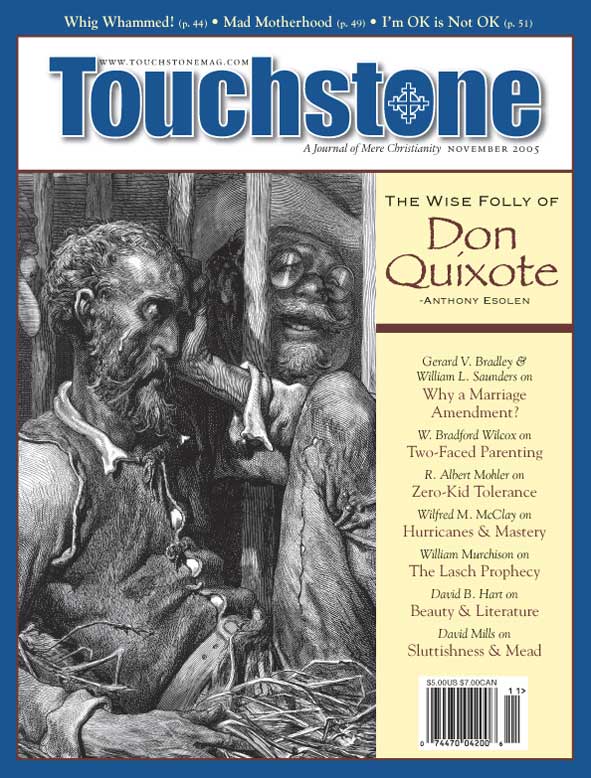Self-Esteem Scheme
One Nation Under Therapy by Christina Hoff Sommers and Sally Satel
One Nation Under Therapy: How the Helping Culture Is Eroding Self-Reliance
St. Martin’s Press, 2005
(310 pages, $23.95, hardcover)
reviewed by Richard Kirk
As the title of this book suggests, for many Americans the republic’s fate rests not in the hands of a supreme deity but on the ministrations of post-traumatic grief brigadiers. Blind faith in proactive intervention has replaced the stoic virtue of self-restraint or the more mundane technique of focusing attention on other matters. Such is the point of view that One Nation Under Therapy was written to refute.
“Therapism” is the derisive term that the authors, social critic Christina Hoff Sommers and Yale psychiatrist Sally Satel, assign to a wide-ranging set of ideas. According to these American Enterprise Institute scholars, therapism “valorizes openness, emotional self-absorption, and the sharing of feelings.”
In addition, it presupposes an “anguished and . . . apprehensive public [that] requires a vast array of therapists, self-esteem educators, grief counselors, workshoppers, healers, and traumatologists to lead it through the trials of everyday life.” The necessity of high self-esteem is its psychological cornerstone.
According to this perspective, children are an especially vulnerable group that requires special protection from the emotional depredations of growing up. Indeed, under the influence of this fragile-ego philosophy, some teachers have consigned the once-popular game of dodgeball to a recreational “Hall of Shame.” In place of aggressive, ball-related activities, this philosophy prefers non-competitive diversions like scarf-juggling—since scarves, as a prominent fitness advocate noted, “are soft, nonthreatening, and float down softly.”
Failing Narcissists
Against these notions, which transform childhood itself into a pathology, Sommers and Satel employ a wealth of material (the book has eighty pages of endnotes) to argue that an overly protective environment where individuals constantly focus on their own feelings, and are expected to feel good about themselves, is counterproductive, both in education and in therapy. For example, Roy Baumeister’s comprehensive review of the topic, published in the May 2003 issue of Psychological Science in the Public Interest, finds that students who give themselves high marks in self-esteem tend to be more narcissistic and combative than those who offer more modest evaluations.
The promotion of self-esteem is not the only area where therapism has intruded into education. The authors tell about an 11-year-old girl whose New York City curriculum encourages her and her classmates to probe “deeply into their experience.”
In perfect compliance with expectation, young Erica composed and read aloud a highly emotional essay in which she expressed profound shame for not having expressed her love to a dying great-grandfather. The manipulative quality of this assignment becomes apparent when one discovers that her grandfather died when she was two years old.
Richard Kirk is a freelance writer living in southern California whose book Moral Illiteracy: "Who's to Say?" is also available on Kindle.
subscription options
Order
Print/Online Subscription

Get six issues (one year) of Touchstone PLUS full online access including pdf downloads for only $39.95. That's only $3.34 per month!
Order
Online Only
Subscription

Get a one-year full-access subscription to the Touchstone online archives for only $19.95. That's only $1.66 per month!
bulk subscriptions
Order Touchstone subscriptions in bulk and save $10 per sub! Each subscription includes 6 issues of Touchstone plus full online access to touchstonemag.com—including archives, videos, and pdf downloads of recent issues for only $29.95 each! Great for churches or study groups.
Transactions will be processed on a secure server.
more from the online archives

8.4—Fall 1995
The Demise of Biblical Preaching
Distortions of the Gospel and its Recovery by Donald G. Bloesch
calling all readers
Please Donate
"There are magazines worth reading but few worth saving . . . Touchstone is just such a magazine."
—Alice von Hildebrand
"Here we do not concede one square millimeter of territory to falsehood, folly, contemporary sentimentality, or fashion. We speak the truth, and let God be our judge. . . . Touchstone is the one committedly Christian conservative journal."
—Anthony Esolen, Touchstone senior editor









